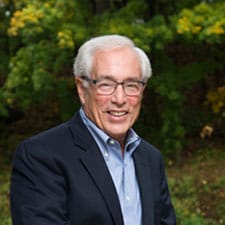Our next Wharton Effect installment begins as a tragedy. It begins with the story of S. Chris Mader WG67 GR73, who pioneered one of the first computerized business management simulations as a professor and senior lecturer at Wharton in the 1970s. Mader took the so-called “Wharton Game”—a simulation of a competitive business environment in which students vie against one another as leaders of companies—and put the game on personal computers (or whatever computers were available back then). In 1978, Mader launched an eponymous consulting firm to take the simulation to the business masses. An estimated 5,000 students and business executives played his version of the game, until his untimely death Dec. 4, 1980, in a hotel fire in White Plains, New York.

Joseph Gekoski
After the tragedy, former students Joseph Gekoski WG72 and Michael Aronson W78 took what they learned from Mader and launched Strategic Management Group Inc. (SMG). SMG grew over the next two decades to become a major player in workplace training, not just in Philadelphia but across the nation.
Robert Brodo W83 had taken Mader’s Strategic Planning course, with the Wharton Game simulation, and was hooked. When he left Wharton, Brodo had his sights set on the workplace training space—and in particular, on SMG. He joined the company in 1986 and rode its growth until venture capital group Behrman Capital bought the company for $50 million in September 2000. Brodo and Gekoski parted ways. Gekoski focused in part on teaching at Villanova University. Brodo moved into several other business opportunities, including launching his own technology company. (Aronson went on to co-found University City venture capital outfit MentorTech Ventures in 2005.)

Robert Brodo
As often these Wharton Effect stories go, a chance encounter moved the plot along. In this case, Brodo and Gekoski bumped into each other in a Starbucks in 2005. Part of their catching-up process involved a discussion of human capital development—what else!?—and how it was more critical than ever.
“Much more than it was 25, 30 years ago when [human capital development] was nice to have,” Brodo says.
We can imagine Brodo and Gekoski sighing over their cappuccinos and simultaneously saying of workforce training, “I love this business.” But instead of their identical statements being a jinx, their shared appreciation led to what can be considered the next generation of Mader’s teachings: a new company launched in 2006 called Advantexe.

Jim Brodo
It focuses on lab training and business simulations. What West Conshohocken, Pennsylvania-based Advantexe does with management simulation, Brodo explains, is 75 percent proprietary and 25 percent based on open simulation systems. Clients include ADP, Pfizer, McKesson and Merck. Besides the focus on computer simulation, what continues from the early days in Mader’s classrooms is the passion.
“What’s really cool is that we use these computer-based business simulations … so that [managers] can learn in a laboratory and they don’t have to make real mistakes,” Brodo says. “It’s not every day that you can teach and train the leaders and future leaders of companies.”
What Gekoski and Brodo offer—and really what any human capital training service offers—can be broken down into a number of steps:
Step One:
First and most importantly, aligning business strategy with the competencies of managers’ job functions. The common mistake, says Brodo, is for companies to fill job openings with people who can get the current job done—not necessarily the jobs the company will need done in the future.
Step Two:
Talent assessment—through formal and behavioral assessment and exercises. The goal: Find the gaps.
Step Three:
Closing those gaps through skills development, which is where business simulations come in.
Step Four:
Measuring the success of steps one through three. “Revenue and shareholder value are the ultimate measure, but they take some time,” Brodo says.
Since Advantexe’s launch, other Penn-related characters have joined the plot. Brodo brought on board Eric Pressey as chief simulation designer—the brain behind their training algorithm—who had been Brodo’s roommate at Penn when Pressey was majoring in decision science. (He ended up finishing a degree at Penn State University.) The pair have been friends since their roommate days, and Advantexe is the first time they’ve been able to work together. Rob’s brother Jim W88 joined the firm in 2015 as chief marketing officer. Jim had been with SMG from Wharton to the buyout and then continued in the business training field in a marketing executive role with Richardson.
“It’s a dream come true,” the elder Brodo says of his current endeavor.



























